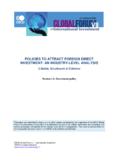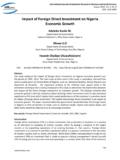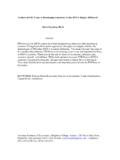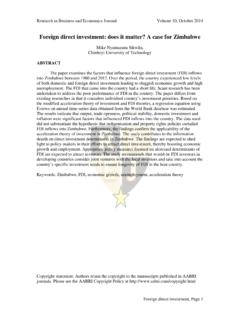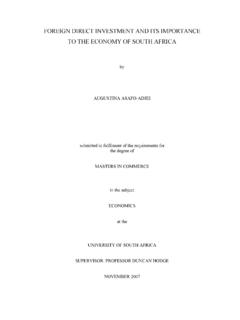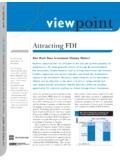Transcription of F FDDII,, HHuummaann CCaappiittaall aanndd ...
1 FFFDDDIII,,, HHHuuummmaaannn CCCaaapppiiitttaaalll aaannnddd EEEddduuucccaaatttiiiooonnn iiinnn DDDeeevvveeelllooopppiiinnngggCCCooouuun nntttrrriiieeesssTTTeeeccchhhnnniiicccaa alll MMMeeeeeetttiiinnnggg13-14 December 2001, ParisGOVERNMENT POLICIES TOWARDS INWARD FOREIGNDIRECT investment IN DEVELOPING COUNTRIES:Implications for human capital formationand income inequalityByDirk Willem te Velde organised by the O E C D Development C entre Research Fellow, International Economics Development Group, Overseas Development Institute,111 Westminster Bridge Road, London SE1 7JD, UK, The aouthor isgrateful to Richard Kohl for helpful :This paper discusses host-country government policy optionsavailable to policy makers to attract foreign direct investment (FDI)and to influence the behaviour of Transnational Corporations(TNCs), with focusing on their effects on human capital formationand income inequality.
2 This paper first reviews FDI policy, with theaim of discussing FDI policies affecting human capital formation. Itintroduces a simple demand and supply framework of the market forskills, which allows us to analyse the effects of TNCs on humancapital and income inequality. FDI policy options are analysedwithin this framework in order to see how FDI policy may haveaffected human capital formation and income inequality. The paperconcludes with suggestions for further globalisation work for development and the poor is a major challenge facingmany developing countries. In particular there is a debate about whether and howgovernments can influence and regulate foreign direct investment (FDI). This paperdiscusses policy options available to policy makers to attract foreign direct investmentand to influence Transnational Corporations (TNCs) once they are operating inside acountry. There are three reasons for the focus on the interaction between FDI andhuman capital formation: human capital formation is often seen as one of the long-term benefits of FDI; human capital is increasingly important in attracting FDI; andhuman capital is an important determinant of spillovers of FDI to the local main question in this paper is what can host-country policy makers do to improvethe impact of TNCs on human capital formation?
3 It is important to understand how FDI policy affects human capital formation as this isone route by which FDI can have consequences for long-term economic policy includes a range of policies that directly or indirectly affect potential orexisting foreign investors or suppliers to TNCs. An understanding of the effects ofFDI policy on human capital formation also enables us to focus on the effects of FDIon the distribution of wages since the distribution of human capital is a majordeterminant of the distribution of wages, for instance between skilled and unskilledworkers. human capital formation in the workforce can be expressed as employmentquality * employment quantity and FDI (policy) can affect both terms. The mainfocus of this paper is employment analyse the effects of FDI policies on human capital formation and incomeinequality, this paper reviews and analyses relationships between three relevant areas:FDI policy, TNC behaviour, and the market for skills.
4 In the Section 2, we reviewFDI policy, with the aim of discussing how FDI policies affect human capitalformation. Then, in Section 3, we introduce a simple demand and supply frameworkto analyse the market for skills (section ). This framework allows us to analyse theeffects of TNCs on human capital and, derivatively, income inequality (section ).We apply FDI policy options to this framework to analyse how FDI policy may haveaffected human capital formation and income inequality in Section 4. The analysis isbased on individual country experiences and findings in the literature, but theevidence is too thin to be provide assurance that conclusions from these sources canbe generalised to all other countries. The paper ends with suggestions for FDI policies and human capital formationAn increasing number of governments want to attract FDI rise because thecharacteristics associated with FDI increasingly fit the government s developmentobjectives (growth, poverty reduction, etc.)
5 This is based on a perception that thepotential positive effects of FDI (growth, technology, skill upgrading, capital)generally outweigh its negative effects (income inequality, environmental 1 The term human capital is used in this paper to denote workforce skills, which depend on formaleducation, formal training, on-the-job training and experience gained by learning and doing. We donot include health aspects, although it should be borne in mind that in many developing countries poorhealth ( due to HIV/AIDS) imparts on the ability to , profit repatriation).2 These development objectives, together with theability to choose the degree of policy intervention and factor endowments, determinea country s FDI strategy. Once the strategy has been determined, there exists anarray of possible FDI policies across the entire policy spectrum to influence (1996, 2000) and Moran (1998) provide a general framework for understandingFDI and FDI policy.
6 Both stress the importance of the host-country policy toovercome information-related market failures with regard to FDI. First, policies arejustified when they address information failures in the international investmentprocess. Second, a government is justified in addressing market failures in the marketfor skills and technologies, and gear the development of technologies and skillstowards the needs of TNCs and other expanding sectors. Third, a country may wantto intervene because of possible externalities associated with TNCs, where theeconomy-wide benefits are not incorporated in the incentives faced by private Overview of host-country policies towards FDITNCs, as carriers of FDI, decide to locate in a foreign location for a number ofreasons. Following Dunning s OLI paradigm (Dunning, 1993), TNCs locating in aforeign location must possess an ownership (O) advantage ( superior technology),the foreign location must have a locational (L) advantage ( available skills) andTNCs must have reasons to internalise (I) operations rather than outsource and licenseforeign firms.
7 Locational advantages often refer to such static concepts as access tonatural resources. However, much attention has also been focused on the importanceof host country policies and institutions that create locational advantages (skills,infrastructure, local supply services, etc.). Such policies become increasinglyimportant in a world where countries have liberalised their FDI regimes and wherecountries are competing for footloose the same time, some governments (perhaps too few), have realised that appropriatepolicies to attract FDI are not sufficient for generating economic development andhave begun to design further policies to make FDI work for development . Thisintegrated approach to FDI policy appears to have been practised by the Republic ofIreland and Singapore, which have successfully attracted large sums of FDI3. Belowwe discuss a policy matrix, outlining possible policy options constituting successfulintegrated FDI policies4.
8 This will frame the discussion of the interaction betweenFDI policy and human capital 1 contains a three by three matrix, which classifies the myriad of policies andfactors affecting FDI. The factors in the first row relate to FDI attraction. Factors inthe second row of the matrix relate to FDI upgrading, by which we mean upskilling 2 Notice that such objectives are unlikely to be the same for all individuals within a country. However,we assume that using some process, a government can formulate development objectives in the interestof the people it represents. In doing so it needs to make statement such as: FDI in natural resources isuseful as long as they fulfil certain criteria; FDI induced growth is desirable even it were to raiseincome inequality, While successful, the specific FDI targeting may have made these countries more vulnerable to USand high-tech recessions. Both countries are also amongst the most unequal of the middle/high This section restricts the FDI policy review to a simple classification (see Te Velde, 2001a), whichprovides the basis for discussing interactions between FDI policy and human capital existing operations, by improving inputs, or attracting new skill-intensiveoperations.
9 Upgrading policies can be of crucial importance determining whetherTNCs decide to simply exploit only the static comparative advantage ( low-wageworkers, tax-havens, natural resources) of operations in their affiliates, or whetherthey decide to upgrade skills, raise productivity and improve the quality of products oftheir final row of the matrix discusses linkages between TNCs and local firms and listskey policy areas and other factors determining the response of local firms to thepresence of TNCs. Factors in this row affect whether local firms benefit from foreignfirms. Successful FDI strategies are likely to follow an integrated approach,containing FDI policies relating to FDI attraction, FDI upgrading and TNC linkagepromotion. The relative mix of policies depends on pre-existing conditions, theobjectives of the FDI strategy, and the type of investment that fits into the 1 Policies and factors affecting inward foreign direct investmentEconomic policies largely under domestic controlOther policies and factorsIndustrial policiesMacro-economicpoliciesAffecting potentialforeign investors( determinants )- Financial and fiscalincentives andbargaining- Efficient administrativeprocedures and rules onownership- Promotion, targetingand image building- Developing key sectors(agglomeration andclustering)- Developing exportplatforms (EPZs)
10 - Availability ofinfrastructure and askilled workforce andgood labour relations- Sound macro-economicperformance andprospects- Privatisationopportunities- Development offinancial market andexternal debt No impediments totrade of goods andservices- Global and regional economicintegration and transportationcosts- International, regional andbilateral treaties, including BITsand Insurance (ICSID, MIGA, ECGD,OPIC) and political risk ratings- Location near large and wealthymarkets- Availability of natural resources- Historical ties and language-use- Absence of corruption andconflict- Financial conditions in homecountriesAffecting establishedforeign investors( upgrading )- Tax/Subsidy system- Performancerequirements (abolishedin most cases underTRIMS)- Interaction withresearch institutionsand other firms- Encouragement ofR&D- Training of employees- Labour market policy- Trade policies, exportpromotion andinfrastructure- Competition policy- Development offinancial market- Regional and internationalinvestment treaties- Global economic integration- Civil societyAffecting the responseof domestic firms( linkages )- Encouragement oflinkages with TNCs- Encouragingtechnologicalcapabilities (R&D)- Encouraging humanresources (training)- Supply sidemanagement- Education and skillgeneration- Labour mobility- Competition policy- Export promotion- Global economic integrationSource: Te Velde (2001a)5 The three columns in Table 1 show three different types of policies and factorsindicating the degree to which host country actions relate to FDI.










